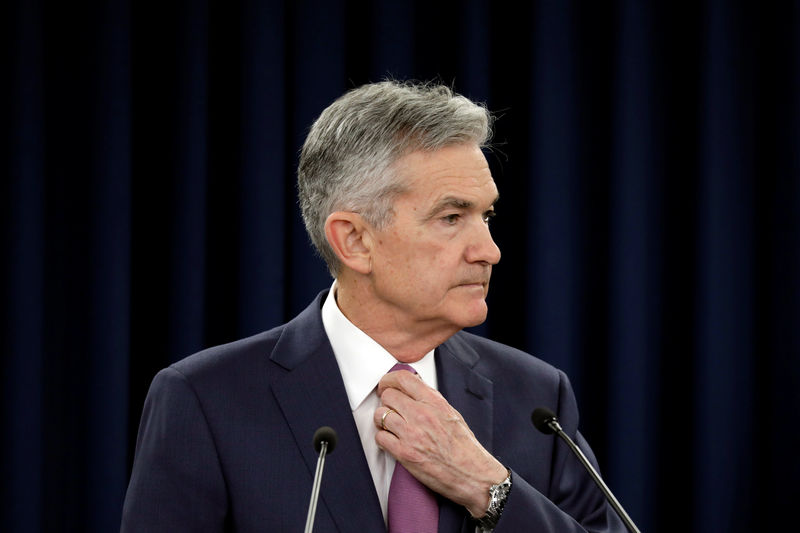(Bloomberg) -- Jerome Powell had a ready answer to counter criticism that the Federal Reserve is running risks with inflation, as he signaled it will maintain aggressive support as the U.S. recovery gathers speed.
“The economy is beginning to move ahead with real momentum,” the Fed chair told reporters Wednesday after the central bank held interest rates near zero and kept bond purchases at $120 billion a month.
That’s likely to push up prices amid surging demand, but “an episode of one-time price increases as the economy re-opens is not the same thing as, and is not likely to lead to, persistently higher year-over-year inflation,” he said.
Powell was dismissive of anecdotes of labor shortages, explaining it mostly as an allocation problem, while also noting that millions of workers thrown out of employment during the pandemic are still on the sidelines.
He also said that employers didn’t seem to be bidding up wages yet, despite the claims of scarcity in some sectors. And he played down the rise of goods prices as a matter of supply catching up with demand as a recovery takes hold.
During one detailed answer on inflation he appeared to be reading from notes -- reinforcing the impression that he’d expected to be confronted about price pressures amid ultra-easy Fed policy -- and wasn’t going to back down.
“I took away that not even any preliminary discussion of a change in policy is imminent,” said Carl Tannenbaum chief economist at Northern Trust (NASDAQ:NTRS) in Chicago. “He gave a spirited defense of the Fed’s view on inflation and employment. They are very happy with the course they are on and not likely to change it soon.”
Powell and his colleagues met amid growing optimism for the U.S. recovery, helped by widening vaccinations and aggressive monetary and fiscal support.
President Joe Biden will unveil a sweeping $1.8 trillion plan to expand educational opportunities and child care when he addresses a joint session of Congress later on Wednesday, while highlighting his $2.25 trillion infrastructure proposal and the $1.9 trillion pandemic relief package he signed into law last month.
What Bloomberg Economics Says
“We continue to expect tapering to occur in the first quarter of 2022 and interest-rate liftoff to begin sometime around 2024-25”
-- Carl Riccadonna and Yelena Shulyatyeva (economists)
-- Click here for full report
At the same time, a rise in coronavirus cases in some regions around the world casts a shadow over global growth prospects, giving policy makers reason to remain patient on withdrawing support.
Marking a clear improvement since Covid-19 took hold more than a year ago, the Fed said in its statement that “risks to the economic outlook remain,” softening previous language that referred to the virus posing “considerable risks.”
U.S. central bankers repeated they would not change the pace of bond buying until “substantial further progress” is made on their employment and inflation goals. The target range of the benchmark federal funds rate was kept at zero to 0.25%, where it’s been since March 2020.
Not Time
Powell said that it was not yet time to discuss scaling back asset purchases, while acknowledging a strong U.S. employment report in March which saw 916,000 jobs added to nonfarm payrolls.
“When the time comes for us to talk about talking about it we’ll do that. But that time is not now,” he said. “We’ve had one great jobs report. It’s not enough. We’re going to act on actual data, not on a forecast, and we’re just going to need to see more data. It’s no more complicated than that.”
Powell suggested the central bank will look through inflation readings above its 2% target, though if it were to move “persistently and materially above 2% in a manner that threatened to move longer-term inflation expectations materially above 2% we would use our tools to bring inflation expectations down to mandate consistent levels.”
“Markets are having a hard time digesting this -- there is a split whether inflation pressures are going to end up being persistent and what this means for the Fed,” said Michael Gapen, chief U.S. economist at Barclays (LON:BARC) Plc. “The Fed is saying, ‘I hear you. Inflation is going to be above 2% for a while, but I am trying to tell you we are not going to do anything about it.” That means the judgment on tapering bond purchases will be measured by gains in the labor market “almost exclusively.”
Read More
Powell Breaks Out the ‘Froth’ Word When Asked About Markets
Powell Says Archegos Collapse Revealed Breakdowns at Some Banks
Powell Reins In the Treasury Market’s Angst with Dovish Message
Fed’s First Two Sentences May Signal Its Shift: Brian Chappatta
Five Takeaways From Fed’s Decision, News Conference: TOPLive
©2021 Bloomberg L.P.
